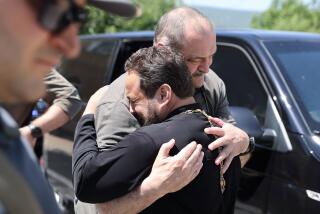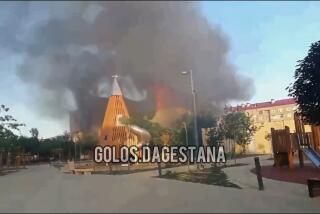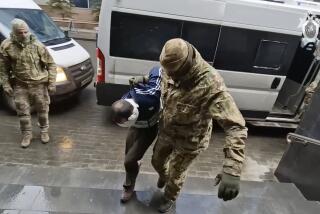Islamic Fervor Unnerves Russia’s South
- Share via
MAKHACHKALA, Russia — Prayer beads click on the street again and newly built mosques rise into the sky. Russia’s Muslim south is in the throes of a religious revival, and would-be leaders are lining up to bring the faithful back to God.
Where just a few years ago red flags and the bearded image of V. I. Lenin, founder of the Soviet state, sprouted from every public building here, now the flags are Islamic green and the iconic bearded face on the banners is that of the region’s holy warrior-hero, the 19th century Imam Shamil.
The public renaissance of their faith and traditions, after decades of Soviet repression, is a source of innocent joy to most people in the Russian republic of Dagestan, next to the Caspian Sea.
“When I was a kid, everything about religion had to be kept quiet,” said Timur Dzhafarov, 26, a journalist. “You’d say things like ‘Have you washed yet today?’ to your sister, when you were really talking about praying. That wasn’t long ago; but, thank God, it’s all finished.”
But the new Islamic fervor is also starting to become a source of worry, playing on Russia’s fears that militant fundamentalism could seep in through its southern border and destabilize an already volatile frontier region.
Some Dagestanis fear that their leaders are peddling religion like a once-banned drug to distract public attention from the republic’s high crime rate and faltering economy. Others worry about worsening rivalries between the men who want to control the religious reawakening. Still others fret about the harsh influence of a new fundamentalist movement imported from Saudi Arabia.
Muslim separatists in war-ravaged Chechnya, on Dagestan’s border, are adding to the concerns of moderates with their overtures to the faithful of Dagestan to join up in a “single spiritual space”--suggestions sure to anger the region’s powerful overlord, Moscow.
“What’s going on now is the over-idealization of Islam,” said Garun Kurbanov, head of the cultural faculty at Makhachkala University. “We seem to be going straight from one mono-ideology, worship of Lenin, to another.
“Islam,” he added, “certainly played the biggest role in the formation of Dagestan’s national identity ever since the 8th century. But the many other cults and religions that have been observed here also played their part.”
Now, however, he noted, “it’s only politically correct to take Islam into account. Ten years ago, most people in Soviet Dagestan would have called themselves atheists, at least in public, although many quietly believed in private. Now 90% of people say they’re Muslims, although it’s my opinion that only half of them are really convinced believers and the rest are waverers on the edge of faith or just followers of fashion.”
For many Dagestanis, taking refuge in religion is a relief from the chaos in other parts of their post-Soviet lives.
Makhachkala is an unkempt, struggling capital. Unemployed youths loiter, smoking, on street corners outside crumbling apartment blocks. Nervous hotel staff operate from behind iron grilles, guarded by gunmen. Suspicious characters frequent rackety casinos and bars. Middlemen charge would-be students bribes of thousands of dollars apiece to sign up at the university.
Crime rates are higher than in other parts of Russia. After a 21-month war between the Russian army and the Chechen separatists, the whole region is awash with guns. Soviet-era factories have shut down, and the local economy runs at least in part on illegal trade in caviar, oil and guns and on dubious import-export business among Russia, Turkey and the Middle East. Political assassinations are regular events.
Although wages go unpaid for months and goods too expensive for most people to buy are flaunted in the stores, a sleek new-rich class of entrepreneurs, politicians and hoods-made-good is building a luxury district of overblown mansions.
But while tales of the secretive banking and smuggling and drug-trafficking activities of top officials are whispered in the privacy of family kitchens, public debate as reported in the meek local press focuses on “safe” questions about religion--whether good Muslims would accept the idea of putting up a memorial to Imam Shamil, or how best to celebrate this year’s 200th anniversary of the warlord’s birth.
“It’s natural for our minds to turn to religion in these troubled times. Who can we look to but God to save us from this mess?” said Fatima, 42, a formerly atheist teacher in sensible clothes and a white head scarf.
Several colorful figures have stepped forward to guide the popular enthusiasm for Islam.
Saidmukhammed Abubakarov, Dagestan’s respected official cleric, says that he only reluctantly accepted the job of mufti when it was pressed on him a few years ago. He won fame when, in 1991, he joined a popular movement to unseat the puppet clergy who had earlier administered a tame, Soviet-approved version of Islam.
But now a quarrel over the direction of Dagestan’s religious movement is splitting public opinion and undermining the mufti’s authority.
Abubakarov’s opponent is flamboyant Nadyrshah Khachilayev, one of a family of tall, bearded brothers who have risen to prominence in post-Soviet times. Another brother, Magomed, is the fisheries minister. Nadyrshah, who says proudly that he met Nation of Islam leader Louis Farrakhan and boxer Mike Tyson during a recent visit to Chicago, is the founder of the 2-year-old Russian Muslim Council.
In July, Khachilayev used the Moscow and local press to denounce Dagestan’s other Muslim leaders. He said the mufti’s office was encouraging Dagestanis to “bow to political authorities who are mired in corruption.” Khachilayev also tongue-lashed traditional village sheiks who quietly practiced their faith in Soviet times, saying they “all went through KGB instruction . . . and history will show how many are also British spies.”
The mufti said he summoned Khachilayev for a “necessary” three-hour dressing-down after reading the article, demanding he withdraw it. “Last year we shared organizing everything,” Abubakarov lamented. “We’re the two real leaders here, me and Nadyr. He runs a social organization that should be our faith’s political protector. But it seems as though a black cat has been sent to jinx our efforts to cooperate during the past year.”
Quarrels between Muslim leaders apart, the bigger issue of resurgent Islam in the south makes Moscow nervous. The south’s history is one of violent religious-political wars between Muslim guerrillas and Russian armies.
Last century, Shamil, imam of both Dagestan and Chechnya, led his followers on a 30-year holy war against Russian colonial rule, spurred on to resistance against impossible odds by their belief in freedom and God.
This year, as both Dagestan and Chechnya celebrate their shared hero’s anniversary, Russia is being reminded of its recurring fear that a newly Islamicized Dagestan might--as it did last century--join forces with separatist Chechnya and fight to escape Russian rule.
Movladi Udugov, Chechnya’s deputy prime minister and information minister, added mischievously to those fears by bringing together 35 Dagestani and Chechen Islamic groups in Chechnya in August. They established an Islamic Nation movement whose aim, Udugov said, was to reunite Chechnya and Dagestan.
But few people in politically quieted Dagestan are keen to repeat the Chechen experience. Chechnya lost 80,000 people under attack by Russian troops from 1994 to 1996, and the rebel republic’s postwar experiments with Sharia law based on the Koran--including public floggings and televised executions--have caused horror elsewhere in Russia.
Dagestan’s Communist-led government is eager to avoid giving offense to Russia and drawing retribution. “They say we mustn’t do anything to upset Moscow because they’ll cut off government funds,” Khachilayev said.
The most pressing religion-related worry of all, for phlegmatic city types in Makhachkala, is the quiet rise of the fundamentalist Wahhabi movement from Saudi Arabia. Unlike the folksy Islam of southern Russia--a type of Sufi mysticism--this movement is purist, radical and, say its opponents, dangerous.
Conflict between Wahhabis and traditional Sufi believers hit the headlines in Dagestan in May, when 1,000 rivals clashed in the central village of Karamakhi. Three people were killed.
The village, it emerged, was well supplied with weapons, although no one could say from where. Karamakhi has since been a closed area; the few journalists who ventured near the village this summer had film confiscated by gunmen.
Wahhabi violence has also been reported in Chechnya. Khasanbek Yakhyayev, a mullah in the Chechen capital, Grozny, was gunned down outside his home in June. His killer, later slain by Yakhyayev’s relatives, was a Wahhabi believer angered by the mullah’s recent denunciations of Wahhabism.
The religious point of the Wahhabi-Sufi conflict is simple. Over the years, the Muslims of southern Russia formed small Sufi worship groups, based on families and clans; each followed a charismatic leader. This resistance-cell structure helped them survive czarist and Soviet repression. When their leaders died, worshipers made mini-pilgrimages to graves, leaving behind reverent marks of respect--handkerchiefs tied to trees or wishes for a happy future--at what quickly became shrines.
But Islam does not allow priests or shrines, just a direct dialogue between man and God. “The Sufism practiced here is more like Christianity than Islam, with its cults and saints,” said Mohammed Shaffi, a soft-spoken Wahhabi spokesman. “It’s taken on a form which shouldn’t exist in Islam.”
The Wahhabis’ ostentatious purity does not impress Makhachkala’s sophisticates. “I can’t see why they think that growing long beards and wearing their trousers three inches too short makes them holier than everyone else,” said one suspicious academic in his 40s. “They’re kids dressing up as devout Arabs. This is not our tradition. It’s time they grew up.
“And where,” he added uneasily, “did they get those guns from in Karamakhi? And whom will they turn them on next?”
For the moment, combined opposition by Sufi sheiks, the mufti and the local government has stopped the Wahhabi from open worship. They have no mosques but pray in apartments and recruit with leaflets. “Right now, circumstances do not allow us to do anything more,” Shaffi said.
But the Wahhabis’ appeals for reform have struck a chord with thousands of young, sometimes well-educated people fed up with government corruption. They sympathize with the Wahhabi goal of sweeping out bad old habits, religious and political alike.
“I think what they preach is interesting,” Dzhafarov said. “I’m not ready to follow them yet; I still like smoking and drinking and nights out with the guys, and my wife doesn’t think much of the idea of covering up. But in a few years--once we’ve all got more used to the idea of religion being a part of our lives--I could easily see myself joining the Wahhabi.”
More to Read
Sign up for Essential California
The most important California stories and recommendations in your inbox every morning.
You may occasionally receive promotional content from the Los Angeles Times.













